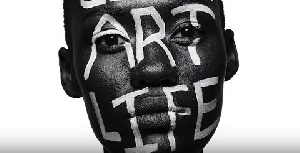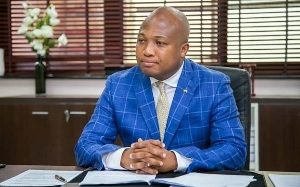African art was literally brought to life when several seemingly normal artworks lining the entrance of the Absa Gallery in Johannesburg, South Africa came alive with subtle human movement as guests entered the venue at this year’s prestigious L’Atelier art awards by Barclays Africa and SANAVA.
The ceremony that followed reflected the idea of giving art a platform to thrive, as the 2017 L’Atelier winners were announced. Maral Bolouri of Kenya took top honours and was awarded the main prize, and Banele Khoza of South Africa walked away with the Gerard Sekoto Award.
The L’Atelier awards entered their 32nd year in 2017, marking another fruitful year of collaboration between sponsors Barclays and South African National Association for the Visual Arts (SANAVA).
Maral Bolouri, a previous 2015 L’Atelier Top 100 finalist, won the overall award for her installation Mothers and Others, a multi-sensory, interactive installation that investigates representations of women in African oral traditions. It explores the power of proverbs by juxtaposing negative and positive depictions of women in cultural truisms.
Banele Khoza has also been a Top 100 finalist in two previous L’Atelier competitions, in 2015 and 2016, and this year was awarded the Gerard Sekoto Award. The Gerard Sekoto Award is awarded to a South African artist who has demonstrated continual improvement in the quality of their entry year-on-year in the L’Atelier.
He won the award for his piece Note Making, which comprises a series of digital drawings printed with an inkjet printer. Through the pieces, Khoza questions representations of what it is to be a male in South Africa and within the broader social context.
Priscilla Kennedy of Ghana picked up the first Merit Award for her piece Untitled 2016, which takes a jab at the social stereotype that women are tools of seduction.
Kennedy is presently studying towards a BA (FA) at the Kwame Nkrumah University of Science and Technology, Kumasi, Ghana. Since 2015 she has participated in several group exhibitions in Ghana.
Description of Artwork:
This body of work depicts an embroidered female figure in pink underwear on a forest green keffiyeh (scarf), trying to hold both hands at her back – this may seem impossible but she still tries.
This takes a jab at the social stereotype that women are tools of seduction. There is this kind of sacredness that the piece may seem to profane but it’s not only the profanity that the work portrays but also the sacredness of this particular headdress.
With the kind of iconography and paradox that comes into the work, it’s literally giving women visibility through both the work’s medium and its artistic technique, considering the contradictive nature of both materials. This work of art renders a two-dimensional view; the front which may be perceived as accomplished and the back that looks loose.
South African Wilhelmina Nell was awarded the second Merit Award for her piece No Evidence of a Struggle. This bronze, wax paper and woodwork of a lunchbox with uneaten sandwich crusts represent the artist’s interpretation of sloth; the mark of a person unwilling to be proactive in their own personal success.
Compatriot Manyatsa Monyamane scooped the third Merit Award for her photographic work Koko Meikie, which attempts to capture the timeless beauty and style of the South African youth of the 70s, and illustrate how these people define themselves today, 50 years later.
Aside from these five artists, the Top 10 finalists in this year’s L’Atelier included Bright Ackwerh (Ghana, Selfication); Ciara Struwig (South Africa, Evidence); Dale Lawrence (South Africa, Making Work); Elias Njora (Kenya, Foot Print 4); and Oliver Mayhew
The L’Atelier awards were once again open to young and emerging artists from 10 African countries, namely South Africa, Botswana, Ghana, Zambia, Kenya, Uganda, Tanzania, Mauritius, Seychelles and Mozambique.
Dr Paul Bayliss, Absa Art and Museum Curator, says the response from artists in these countries was very positive, demonstrating that up-and-coming African artists realise the value L’Atelier adds to their careers.
“It’s so encouraging to see Africa’s young artists making the most of the opportunities that are being created to support and help grow their careers. It’s important not only that artists take advantage of these opportunities, but that they put their best works forward when doing it. I’m proud to say that this year’s participants didn’t disappoint, and we were treated to exceptional quality works. This bodes well for the future of contemporary African visual art,” says Bayliss.
L’Atelier aims to help further winners’ careers by providing them with unparalleled industry opportunities. For the main and Gerard Sekoto award winners this includes a six-month and three-month art residency respectively at the Cité internationale des arts in Paris. The Gerard Sekoto Award is made possible through a partnership between Barclays, SANAVA, the Alliance Francaise of Southern Africa, the Institut Français Afrique du Sud and the French Embassy in South Africa.
Similarly, the first Merit Award prize comprises a three-month art residency at the Bag Factory in South Africa; the second Merit Award, a two-month art residency at the Sylt Foundation, on the island of Sylt in Germany, and the third Merit Award, a one-month art residency with the Ampersand Foundation in New York, USA.
Among the Top 10 finalists in this year’s L’Atelier also included another Ghanaian Bright Ackwerh. All Top 10 finalists are also placed on a two-day art professionalism course to assist them in managing their careers.
Professional and self-taught young, emerging artists from these same 10 countries will once again be invited to maximise these valuable opportunities in the 2018 edition of the L’Atelier competition, which will continue tonight’s creative idea under the overarching theme ‘Give art life’. Entries open in February 2018.
Members of the public can view the Top 100 best artworks from the 2017 Absa L’Atelier at the official L’Atelier exhibition, running from 14 September 2017 to 27 October 2017 at the Absa Gallery in Johannesburg, South Africa.
Entertainment of Tuesday, 19 September 2017
Source: bjrlivefm.com

















